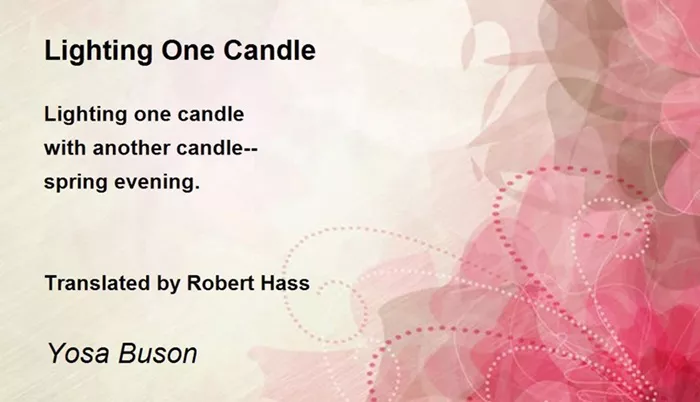Welcome to Poem of the Day – Lighting One Candle by Yosa Buson.
Japanese poetry, with its brevity and depth, often reflects the delicate and profound nuances of life, nature, and human emotions. One of the most remarkable aspects of Japanese poetry is its ability to encapsulate profound meanings within a few carefully chosen words. “Lighting One Candle” is a metaphorical expression that can be seen as a poignant example of this artistic tradition. While not necessarily a specific poem, this concept draws on the metaphor of lighting a candle, which is often used in literature to symbolize enlightenment, hope, or even the fleeting nature of existence. In the context of Japanese poetry, this metaphor evokes a deeper understanding of impermanence, introspection, and the simplicity that characterizes much of the poetic form.
Lighting One Candle Poem
Lighting one candle
with another candle—
spring evening.
Lighting One Candle Poem Explanation
The Symbolism of the Candle
In Japanese literature, candles are not merely sources of light; they carry significant symbolic weight. The flame of a candle represents transience, a core theme in many forms of Japanese art, particularly in the concept of wabi-sabi. Wabi-sabi is the aesthetic that embraces the beauty found in imperfection, impermanence, and the natural cycle of growth and decay. Just as a candle’s flame burns brightly for a fleeting moment before extinguishing, so too does life—brief, beautiful, and inevitably fading.
The act of lighting a candle in poetry often symbolizes an attempt to illuminate the darkness, whether literal or metaphorical. It signifies a desire for clarity, understanding, or even spiritual awakening. In Japanese culture, where much emphasis is placed on the appreciation of the moment and the acknowledgment of life’s transient nature, the lighting of a single candle evokes a profound meditation on the passage of time and the ephemerality of human experience.
The Quiet Nature of Japanese Poetry
Japanese poetry is often characterized by its restrained elegance and subtlety. It doesn’t seek to overpower with grandiose declarations but instead invites contemplation through simplicity and understatement. In the case of the metaphorical act of lighting one candle, the quiet act of ignition itself becomes a powerful statement about the human condition. The poem may not need to describe a long journey or an epic struggle; instead, it focuses on a single, often solitary moment that encapsulates a deeper truth.
This quietness in Japanese poetry can be seen in the form of haiku, a traditional Japanese poetic structure known for its brevity and precision. A haiku typically consists of three lines with a syllable pattern of 5-7-5, and it often highlights a natural scene or moment of personal reflection. A haiku that contemplates lighting a candle might describe the flame in relation to the darkness around it, capturing a fleeting moment of insight or peace. This aligns with the idea of mono no aware, the Japanese concept of the “pathos of things,” which conveys the sadness and beauty of life’s impermanence.
The Poem’s Emotional Depth
Although lighting one candle may seem like a simple, almost mundane act, in Japanese poetry, it is a deeply emotional gesture. The flame represents not only enlightenment or hope but also vulnerability and the fragility of life. The act of lighting a single candle can evoke a sense of solitude, as one must often light a candle in the quiet of one’s own space, away from the distractions of the world. In this context, the candle becomes a symbol of personal reflection and introspection. The light it casts is not intended to illuminate the entire room but to create a small, intimate space for thought, where one can confront their own feelings or uncertainties.
Moreover, lighting a candle may evoke feelings of loss. In Japanese culture, the act of lighting candles is often associated with memorials and rituals for the deceased. The candle’s light may symbolize a life that once burned brightly but has now been extinguished. In this sense, the poem could reflect the Buddhist belief in the cycle of life and death, where the lighting of a candle signifies the continuation of life, even in the face of loss.
A Meditation on Simplicity
At the heart of the “Lighting One Candle” metaphor is the concept of simplicity. Japanese poetry often seeks to distill experience down to its essence. In the same way that a candle, though small and unadorned, can provide warmth and light, a Japanese poem can distill an entire emotional landscape into a few lines of carefully chosen words. This minimalist approach is not about eliminating meaning but rather about focusing on what is most important and allowing the reader to fill in the gaps.
Lighting a single candle, then, can be seen as a metaphor for how small actions or moments can carry profound significance. In a world that often values grand gestures, the quiet act of lighting one candle can stand as a reminder that the simple things in life—an honest thought, a gentle gesture, or a moment of introspection—can often carry the most weight.
Conclusion
“Lighting One Candle” in Japanese poetry ultimately conveys a message of quiet resilience, the acknowledgment of impermanence, and the beauty found in simplicity. The act of lighting a candle, whether as a metaphor or in practice, becomes an expression of hope in the darkness, a small but meaningful way to bring light to a world that is often shadowed by uncertainty and loss. In a broader sense, this concept mirrors the universal human experience: while our lives may be brief and often marked by struggle, each moment has the potential to illuminate our path and guide us toward understanding.

